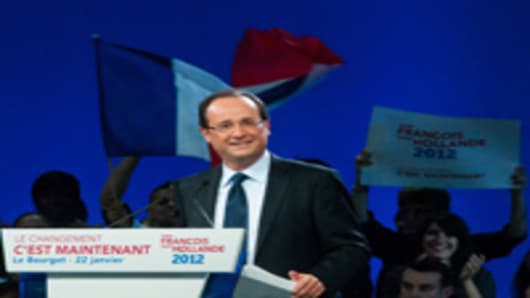Having battled his way to the Eylsee Palace and the French presidency Francois Hollande’s leadership will be tested by a far less conclusive election result from Greece.
Tomorrow he flies to Berlin to meet Angela Merkel for talks that will see the new French president forced to try to find a way of dealing with Greek voter’s rejection of the country’s enforced austerity under the terms of its EU/IMF bailout deal.
We know his anti-austerity rhetoric got him elected but it remains to be seen if he can win the argument with Merkel and her allies who have forced the euro zone’s periphery into accepting huge government spending cuts in return for bailout funds and the support of the ECB.
Analysts believe Hollande will have to win the support of other euro zone members if he is to be able to change Germany’s hardline tone on austerity.
“Hollande has made it clear in advance that he believes that European economic policy, and European Central Bank (ECB) policy, should give greater priority to supporting economic growth. Of course, his current German counterparts do not share those thoughts, but many other countries probably do” said Jim O’Neil, the chairman of Goldman Sachs Asset Management in a research note.
The problem according to Bob McKee of Independent Strategy is that EU leaders all agree on the need for growth but disagree on how to get there. “Hollande’s pro-growth strategy is about higher state spending. It is about higher taxes on the rich and productive enterprise and more state sponsored jobs. The result will be a boost in French state expenditure to 60 percent of GDP from around 58 percent”
“There will be less growth and the tax income won’t materialize” warns McKee who is not confident anyone has the answer in the short to medium term.
While it is true that debt sustainability needs growth, the programme Hollande advocates will not produce it. It is the type of supply side reform, recently espoused by Mario Draghi, that will boost productivity, competitiveness and growth — but after several years delay” said McKee.
Hollande will now be focused on winning a majority in the French parliament in elections that will take place in early June and will push ahead with domestic reforms to help achieve this, according to Nomura political analyst Alistair Newton.
This will include reducing the retirement age to 60 for some workers, capping bosses pay at a 20:1 ratio in state-owned enterprises and a 30 percent pay cut for himself and his ministers, according to Newton who says Hollande’s choice as finance minister will be important.
“We see the moderate Michael Sapin, a former finance minister and currently Hollande’s top economic advisor, as a likely finance minister, as well as, possibly, the current head of the World Trade Organization, Pascal Lamy,” said Newton in a note to clients following Hollande’s victory.
Whoever he chooses will have a tough time pushing through a deal on a growth pact at the European level according to Newton.
“In our view, Ms Merkel accepted the need for a package of pro-growth structural measures as long ago as January, after EU leaders had approved the fiscal compact. Where the catches may lie is in two respects, whether the growth package should be agreed before or after ratification of the fiscal compact, and agreement over the precise measures to be taken”



